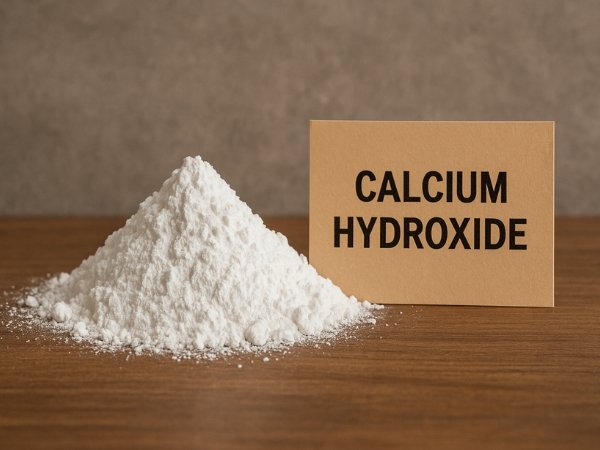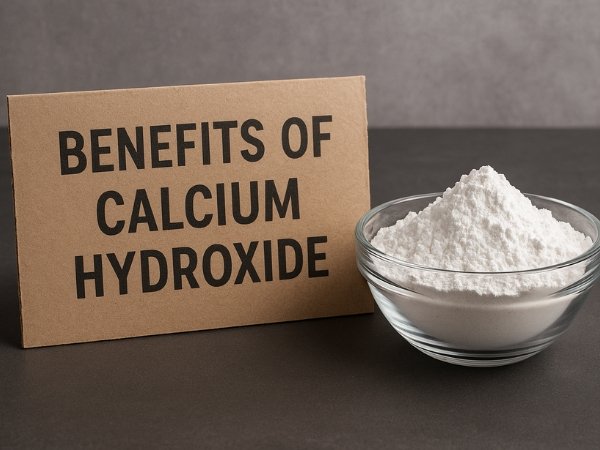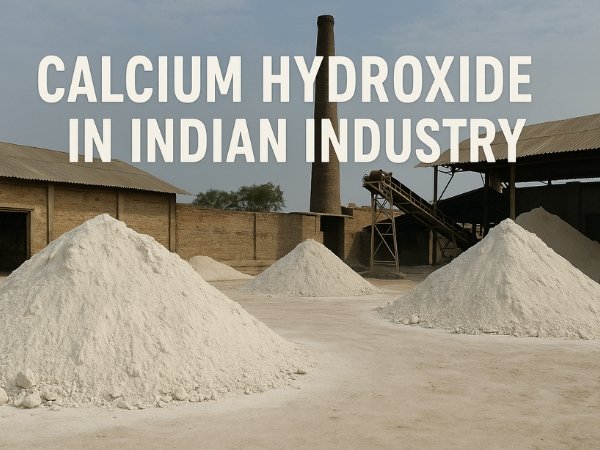Calcium hydroxide, also known by its chemical formula Ca(OH)₂, is a widely used inorganic compound. When water is added to calcium oxide, or quicklime, calcium hydroxide is produced. Commonly referred to as slaked lime or hydrated lime, this white powder plays a vital role in many sectors, including agriculture, construction, water treatment, and food processing.
Understanding the benefits of using calcium hydroxide in these varied applications helps industries make informed choices when selecting materials for their processes.
What is Calcium Hydroxide?

Calcium hydroxide, with the chemical formula Ca(OH)₂, is an inorganic compound commonly known as slaked lime. It is made by adding water to calcium oxide, also called quicklime. This reaction creates a white, odourless powder that has widespread applications across several sectors, ranging from agriculture to construction.
Calcium hydroxide is used extensively due to its chemical properties, cost-effectiveness, and environmental safety when handled correctly.
Common Uses of Calcium Hydroxide
Understanding the uses of calcium hydroxide helps explain why it’s such an important material.
1. Construction and Building
- Acts as a key ingredient in mortar, plaster, and whitewash
- Enhances workability and improves resistance to moisture
- Used in soil stabilisation and as a filler in road construction
2. Water Treatment
- Helps remove impurities and soften water
- Controls the pH levels in drinking water and wastewater treatment
3. Agriculture
- Improves soil quality by reducing acidity
- Enhances nutrient absorption for crops
- Aids in pest control through disinfection of soil
4. Chemical Manufacturing
- Serves as a neutralising agent in the production of various chemicals
- Used in petroleum refining and food processing under controlled conditions
Benefits of Calcium Hydroxide

Calcium hydroxide offers multiple advantages across sectors. These benefits are what make it a widely chosen compound in industrial and domestic applications.
1. Cost-Effective and Widely Available
One of the benefits of calcium hydroxide is its affordability. As a by-product of limestone, it’s abundant and easy to produce, which keeps prices low for large-scale usage.
2. Eco-Friendly Nature
Unlike some harsh industrial chemicals, calcium hydroxide is biodegradable and less harmful to the environment when used responsibly.
3. Non-Toxic in Controlled Amounts
Although care should be taken in its handling, calcium hydroxide is non-toxic when used within regulated limits, particularly in agricultural and food applications.
4. Efficient pH Regulation
Its ability to control acidity makes it indispensable in sectors like water treatment and agriculture, where pH balance is essential.
Calcium Hydroxide in Indian Industry

Companies like Shri Jodhpur Lime play a significant role in providing high-quality calcium hydroxide for various industries. Their product supports sectors such as:
- Road and building construction
- Water purification plants
- Fertiliser and pesticide production
- Leather and textile processing
By choosing trusted suppliers, businesses benefit from reliable product quality and consistent supply.
Safety and Handling Tips
While calcium hydroxide uses are wide-ranging, proper safety measures should be followed.
Best practices include:
- Using gloves and protective eyewear during handling
- Storing in airtight containers in a cool, dry place
- Keeping away from incompatible substances like acids
Industries that Rely on Calcium Hydroxide
Several sectors depend heavily on calcium hydroxide for smooth operations:
- Construction: Improves durability of concrete and mortar
- Water Treatment: Removes heavy metals and neutralises acid
- Agriculture: Enhances soil and supports crop yield
- Paper and Pulp: Helps with bleaching and processing
- Sugar Refining: Used for purifying sugarcane juice
Frequently Asked Questions
Q1. What is calcium hydroxide used for?
Answer: Calcium hydroxide is used in construction, agriculture, water treatment, food processing, and chemical manufacturing for pH control, disinfection, and as a binding material.
Q2. Is calcium hydroxide safe?
Answer: Yes, it is safe when used properly. Always follow safety guidelines, such as wearing protective equipment and avoiding inhalation or direct contact.
Q3. How is calcium hydroxide made?
Answer: It is produced by adding water to quicklime (calcium oxide), resulting in a chemical reaction that forms calcium hydroxide.
Q4. Why is calcium hydroxide used in agriculture?
Answer: It helps neutralise acidic soils, improves nutrient uptake by plants, and acts as a natural disinfectant against soil-borne diseases.
Q5. Can calcium hydroxide be used in drinking water?
Answer: Yes, in regulated amounts. It helps treat water by adjusting pH and removing impurities, making it safer to consume.
Conclusion
Calcium hydroxide is a versatile compound with a wide range of applications across construction, agriculture, water treatment, and industry. With its cost-effectiveness and safety profile, it’s easy to see why businesses continue to depend on it.
If your operation requires reliable calcium hydroxide supply, working with an experienced supplier like Shri Jodhpur Lime ensures quality and consistency.



